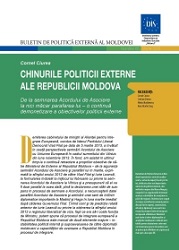Torments of the Foreign Policy of the Republic of Moldova. From Signing the Association Agreement to even not its Initialing - A continuous Demonetization of the Republic of Moldova Foreign Policy Objectives
Torments of the Foreign Policy of the Republic of Moldova. From Signing the Association Agreement to even not its Initialing - A continuous Demonetization of the Republic of Moldova Foreign Policy Objectives
Author(s): Corneliu Ciurea
Subject(s): Governance, International relations/trade
Published by: IDIS VIITORUL Institutul pentru Dezoltare şi Initiative Sociale
Summary/Abstract: The dismissal of the Cabinet of Ministers of the Alliance for European Integration, headed by the Liberal Demo¬cratic Party leader Vlad Filat on 5 March 2013 shrouded in mist the prospects of signing the Association Agree¬ment with the European Union at the summit in Vilnius in November 2013. In fact, we have observed lately a continuous retraction of its own goals by the Ministry of Foreign Affairs of the Republic of Moldova – from the certainty of signing the Association Agreement and its initialing in March, expressed in late 2012 by Vlad Filat and Iurie Leancă, to the for¬mulation of the doubt in mid-February on signing the Association Agreement in Vilnius and the assumption that it will be only ini¬tialed on this date, to the declaration of a state of suspense in the process of signing the Agreement, to not knowing the date of ini¬tialing the Association Agreement and postponement of a series of important diplomatic meetings in Madrid and Hague in March immediately after the fall of Filat Government. Taking into ac¬count the previous failed prediction of Iurie Leancă with regard to obtaining, at the end of 2012, the liberalized visa regime, which almost cost him the Minister office, we may say that the process of European integration of the Republic of Moldova is marked by two major elements - internal political instability and overestima¬tion, by Moldovan diplomats, of the capacity to advance of the Republic of Moldova in the integration process.
Series: Moldova’s Foreign Policy Statewatch
- Page Count: 3
- Publication Year: 2013
- Language: English
- Content File-PDF

